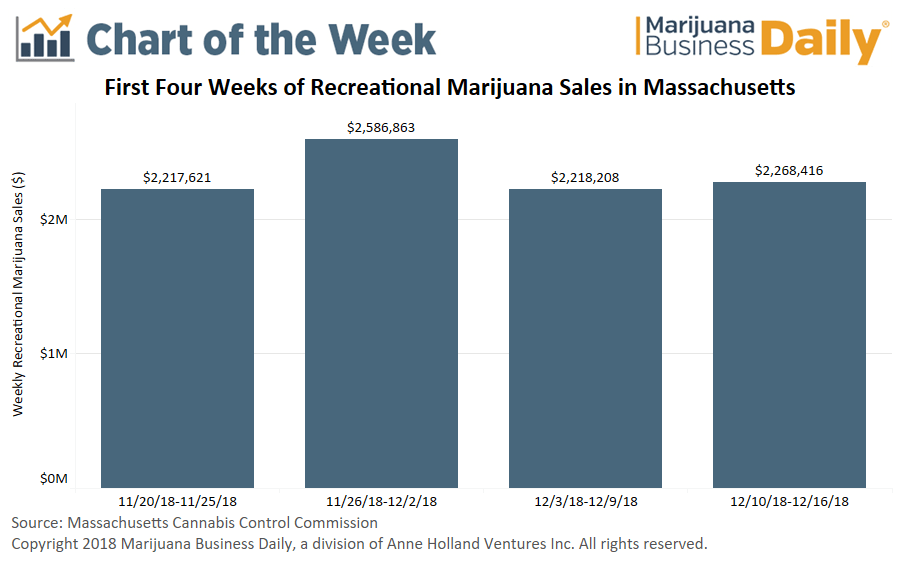A California infused product maker relies on potent growth formula of science, local partnerships and an ethical supply chain to scale
As interest and investments in cannabis-infused beverages grow, one California manufacturer is quickly carving out its niche—and expanding its market share.
Christopher Schroeder and Clayton Coker, co-founders of Somatik, an Oakland-based maker of cannabis-infused cold brew coffee and chocolate products, started their company in 2016. In just two years, they have:s interest and investments in cannabis-infused beverages grow, one California manufacturer is quickly carving out its niche—and expanding its market share.
- Expanded Somatik’s shelf presence from five Bay Area dispensaries to more than 70 shops throughout the state.
- Increased the production capacity of their beverages more than tenfold.
- Relocated from a 200-square-foot manufacturing facility to a 3,000-square-foot commercial space.
- Expanded Somatik’s product line to include chocolate-covered coffee beans and goji berries.
Schroeder and Coker largely attribute their company’s growth to using double-distilled cannabis oil and nanoemulsions in Somatik’s infused beverages, sourcing high-quality wholesale ingredients from local partners and investing in and educating consumers about an ethical supply chain.
“One of the primary things that sets us apart is our focus on elevating cannabis in the eyes of mainstream consumers by pairing it with connoisseur ingredients that consumers are already used to thinking about in terms of notes, flavors and terroir,” Schroeder said.
Dial in the Formula
Coker and Schroeder developed 48 different formulations for Somatik’s infused cold brew coffee. They used a variety of coffee beans, filters and brew times to dial in their final product.
For the THC oil used to infuse the beverage, Somatik’s owners chose a double-distilled concentrate that has upward of 85% THC. Double-distilling the oil creates a more consistent experience for consumers by reducing the terpene profile, Coker said.
Terpene profiles in smokable flower can lead one consumer to have a vastly different experience from another. In edibles and infused beverages, that’s not necessarily a desirable quality.
“Terpene profiles are incredibly important, but we wanted to develop a product that would deliver a consistent experience to people who are newer to the industry,” Coker said.
Infused beverage makers use various strategies—ethanol tinctures, nanoemulsions, microencapsulation or fatty acid-conjugation reactions—to introduce hydrophobic THC oil to the liquid products, Coker said.
Coker, who is a plant biologist and worked on formulations for skin care products before co-founding Somatik, worked with chemists to develop nanoemulsions to infuse Somatik’s cold brew with THC oil.
Nanoemulsions prevent the oil from separating in the liquid and provide better homogeneity in cannabis-infused beverages, Coker said.
The tiny oil droplets are combined with surfactants, compounds that lower the surface tension between the oil droplet and the liquid. One end of the droplet binds to water; the other binds to oil. That makes it easier for the oil to suspend itself in the liquid rather than separate, Coker said.
“We wanted to make sure our emulsion wouldn’t separate or break and that the concentration of the THC is consistent throughout the entire product,” Coker said. “That makes it easier to say with confidence, ‘This is what your experience will be like.’”
Partner With Local Firms
For a cannabis-infused product manufacturer, a strategic partnership with a reputable food or beverage business can:
- Boost the brand’s visibility.
- Earn valuable media coverage and new sales leads.
- Provide new comarketing opportunities.
Coker and Schroeder purchase wholesale ingredients from and have partnered with two well-known Bay Area companies: Ritual Coffee, a coffee roaster and retailer, and Endorfin Foods, an artisanal chocolatier.
During the development of Somatik’s infused cold brew coffee—Somatik Featuring Ritual Coffee—Ritual owner Eileen Rinaldi made her staff available to taste Somatik’s formulations and provide quality control feedback, Coker said.
“That in and of itself was completely invaluable,” Coker said. “At the time, we didn’t have a product on the market and little capital, so to have that expertise given to us was really the only way we could move as quickly as we did.”
The infused cold brew also quickly caught the media’s attention.
The San Francisco Chronicle called the partnership “a classic San Francisco fusion.” One marketing professional told the newspaper the pairing was “brilliant.”
“It was really beneficial in San Francisco to talk about our partnership with Ritual,” Coker said. “People know their coffee and know they like Ritual coffee.”
The newspaper’s coverage prompted dispensaries to contact Somatik about stocking its product and increased foot traffic to retail outlets where the product was available, Coker said.
The two brands have developed cross-promotional marketing strategies, too. Both brands share social media posts that feature the other’s products, and Somatik has used in-store vendor days to share buy-one-get-one Ritual coffee cards or free bags of Ritual coffee with cannabis consumers.
Source Via an ‘Ethical Supply Chain’
Schroeder said he and Coker have an “extreme focus on the ethics of (their) entire supply chain.”
“Cannabis is a healing plant, and we need to ensure that every ingredient in our products supports the ethical values we think this industry represents,” Schroeder said. “It’s easy to lose sight of that, and easy to forget when you manufacture something you are responsible for a much broader environmental and ethical impact than just what leaves your workroom.”
The focus on the ethics of a supply chain often means you have access to higher-quality products, Schroeder said. It also appeals to environmentally or socially conscious consumers.
For example, Somatik’s partners Ritual and Endorfin Foods have direct-trade relationships with the farmers who grow the coffee and cacao beans that Somatik uses in its cannabis-infused products.
Direct trade means the businesses have cut out buyers and sellers and opt instead to work directly with farmers.
In a direct-trade relationship, businesses can have more control over how products are grown and harvested and how workers are treated, Schroeder said.
For example, Ritual worked with several coffee farms to convert them to organic farming practices, and Endorfin is working to have a 100% regenerative farming supply chain.
Direct-trade partnerships can result in higher-quality products, Schroeder said, which translates to better flavors.
Also, the workers who harvest products for Ritual and Endorfin often are paid two to three times more than a fair-trade wage, Schroeder said.
“High-quality ingredients don’t happen by accident,” Schroeder said. “They happen when the supply chain has livable and sustainable wages. A lot of brands are focused





